The teenager watched with rapt attention as Pope John Paul II celebrated a "youth Mass" in the harbor city of Galway like a rock star, declaring in his homily to a festival-like crowd of hundreds of thousands: "Young people of Ireland, I love you."A year and a half later O'Gorman was raped for the first time by a Catholic priest. "When I look back at that visit and see now how it has been remembered, I think about myself at age 13. I was going to Catholic school, I was an altar boy, the youth group I went to took place in a convent. Everything I did, my whole life, the Church was at the center of it," O'Gorman said."And I think about how Pope John Paul II said he loved me — well, he didn't."This weekend will be a moment of reckoning for survivors in Ireland and across the world, as Pope Francis arrives for the first papal visit to the country in nearly four decades amid an intensifying outcry over Church-related abuse scandals.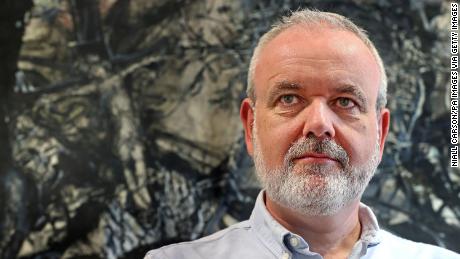 On Sunday, as the Pope delivers a Mass to the faithful in Dublin's Phoenix Park, across town, at the Garden of Remembrance, O'Gorman — who is now the executive director of Amnesty International Ireland — will join thousands to protest clerical sexual abuse. The Pope's trip coincides with the World Meeting of Families, a gathering of the Catholic Church that was thrown into chaos last week by a Pennsylvania grand jury report detailing decades of sexual abuses by priests and cover-ups by bishops. Two American cardinals have had to drop out of the meeting as a result of the report, including Cardinal Donald Wuerl, the former Bishop of Pittsburgh and a key papal ally. Weurl, who was accused of helping to cover up abusive behavior, was to deliver the keynote address on "the welfare of the family." In the wake of the report, the bishop said he "did everything that I possibly could" to stop abuse from happening.
On Sunday, as the Pope delivers a Mass to the faithful in Dublin's Phoenix Park, across town, at the Garden of Remembrance, O'Gorman — who is now the executive director of Amnesty International Ireland — will join thousands to protest clerical sexual abuse. The Pope's trip coincides with the World Meeting of Families, a gathering of the Catholic Church that was thrown into chaos last week by a Pennsylvania grand jury report detailing decades of sexual abuses by priests and cover-ups by bishops. Two American cardinals have had to drop out of the meeting as a result of the report, including Cardinal Donald Wuerl, the former Bishop of Pittsburgh and a key papal ally. Weurl, who was accused of helping to cover up abusive behavior, was to deliver the keynote address on "the welfare of the family." In the wake of the report, the bishop said he "did everything that I possibly could" to stop abuse from happening.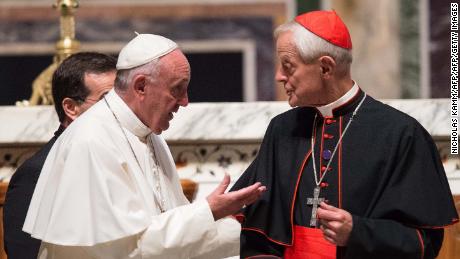 In response to rising anger over the revelations, the Pope issued a letter on Monday acknowledging the church's failure to act over abuse, but the apology has been criticized by victims — as well as Irish clergy members — for not going far enough. And after the Archbishop of Dublin, Diarmuid Martin, sparked outrage earlier this month when he indicated that time would be "very tight" for the Pope to meet with abuse survivors on his two-day visit, the Vatican broke with tradition on Tuesday by confirming that private meetings would indeed take place.
In response to rising anger over the revelations, the Pope issued a letter on Monday acknowledging the church's failure to act over abuse, but the apology has been criticized by victims — as well as Irish clergy members — for not going far enough. And after the Archbishop of Dublin, Diarmuid Martin, sparked outrage earlier this month when he indicated that time would be "very tight" for the Pope to meet with abuse survivors on his two-day visit, the Vatican broke with tradition on Tuesday by confirming that private meetings would indeed take place. 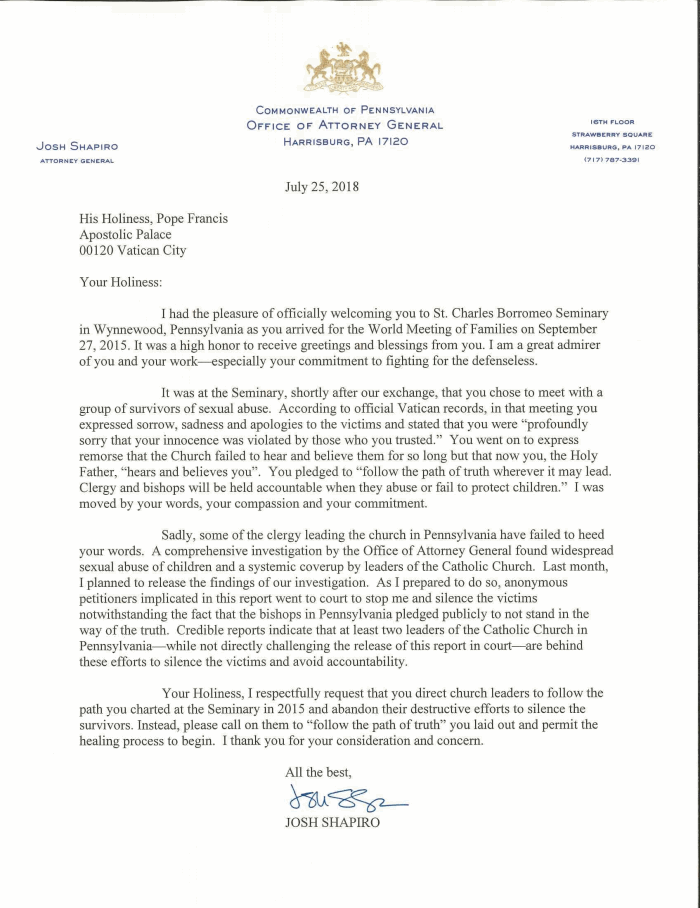 O'Gorman, who sued the Church and won after being sexually abused by a priest between 1981 and 1983, said the Vatican's announcement had created a "soap opera" in Ireland, with members of the media repeatedly calling survivors to ask whether they had been granted an audience with the pontiff."I am disgusted with Pope Francis, and utterly repulsed with how the Vatican has conducted itself," O'Gorman said, adding that if the Pope cared about victims, he would be dragging documents relating to clerical abuse into St. Peter's Square in Rome for the world to see. As the Catholic Church continues to be rocked by sex abuse scandals spanning the globe — most recently in the US, Chile and Australia — pressure is mounting for the Vatican to release records from its secret archives.
O'Gorman, who sued the Church and won after being sexually abused by a priest between 1981 and 1983, said the Vatican's announcement had created a "soap opera" in Ireland, with members of the media repeatedly calling survivors to ask whether they had been granted an audience with the pontiff."I am disgusted with Pope Francis, and utterly repulsed with how the Vatican has conducted itself," O'Gorman said, adding that if the Pope cared about victims, he would be dragging documents relating to clerical abuse into St. Peter's Square in Rome for the world to see. As the Catholic Church continues to be rocked by sex abuse scandals spanning the globe — most recently in the US, Chile and Australia — pressure is mounting for the Vatican to release records from its secret archives. 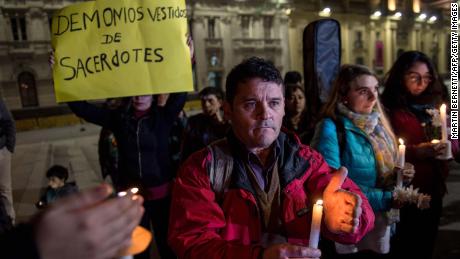 On Monday, BishopAccountability.org, a US-based nonprofit that tracks allegations of abuse against Catholic clergy, published for the first time the names of more than 80 Catholic clerics in Ireland and Northern Ireland it says were convicted of child abuse."There are so many names that are unknown in Ireland, so many priests accused, that are under the radar," Terry McKiernan, founder of BishopAccountability.org, told CNN, adding that the organization hopes the database will encourage the Church to come forward with the names of all priests disciplined over abuse.Mark Vincent Healy, who was sexually abused by two priests, helped BishopAccountability.org compile the list. In 2014, he became the first male survivor of Irish clerical sex abuse to meet with Pope Francis, but he says the Church hasn't done enough in the intervening years.
On Monday, BishopAccountability.org, a US-based nonprofit that tracks allegations of abuse against Catholic clergy, published for the first time the names of more than 80 Catholic clerics in Ireland and Northern Ireland it says were convicted of child abuse."There are so many names that are unknown in Ireland, so many priests accused, that are under the radar," Terry McKiernan, founder of BishopAccountability.org, told CNN, adding that the organization hopes the database will encourage the Church to come forward with the names of all priests disciplined over abuse.Mark Vincent Healy, who was sexually abused by two priests, helped BishopAccountability.org compile the list. In 2014, he became the first male survivor of Irish clerical sex abuse to meet with Pope Francis, but he says the Church hasn't done enough in the intervening years.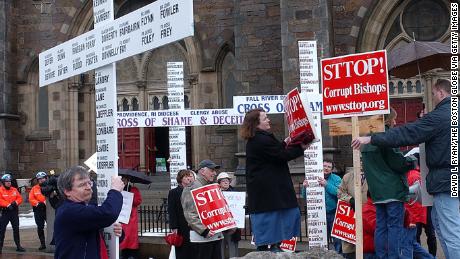 "We're still fighting the same statute of limitations, we're still trying to get services for survivors, we're still trying to stem the self-harm and suicide rates, we're still trying to open closed records. It's too slow," Healy told CNN. Urgent calls for action, and exasperation over the same "cut-and-paste" apologies, are being echoed by survivors across Ireland. Marie Collins, who was assaulted by a priest at the age of 13, resigned last year from a special Vatican commission created by Pope Francis to tackle child abuse, saying that senior clerics in the Church refused to implement their suggested safety policies."What I would like to see when the Pope comes to Ireland, is to come out, not make these sort of 'we're sorry' type of statements, but to tell us what is he going to do — and do it," Collins told CNN. "And it must be something concrete."But there is less consensus about what those concrete steps might be.Since the first reports of abusive priests were released in Ireland in 2005, a torrent of revelations detailing abuse and mistreatment in Catholic-run institutions — from orphanages, to industrial schools, workhouses known as Magdalene Laundries and so-called mother-and-baby-homes — have followed.While Ireland has pledged €1.5 billion to victims through a financial redress program, abuse survivor Michael O'Brien said that compensation wasn't enough — calling on Pope Francis to do more."He must talk to us and tell us what he's going to do about the rape of children that's been done by priests of the Catholic Church today," said O'Brien, a former politician who rose to prominence a decade ago after revealing on Irish television that he was abused in a Catholic school as a child."We're fed up with all this. We want closure. We want it to stop," he told CNN. "I don't see anything at the end of the tunnel. Until I hear something else from the Pope, I won't believe it."
"We're still fighting the same statute of limitations, we're still trying to get services for survivors, we're still trying to stem the self-harm and suicide rates, we're still trying to open closed records. It's too slow," Healy told CNN. Urgent calls for action, and exasperation over the same "cut-and-paste" apologies, are being echoed by survivors across Ireland. Marie Collins, who was assaulted by a priest at the age of 13, resigned last year from a special Vatican commission created by Pope Francis to tackle child abuse, saying that senior clerics in the Church refused to implement their suggested safety policies."What I would like to see when the Pope comes to Ireland, is to come out, not make these sort of 'we're sorry' type of statements, but to tell us what is he going to do — and do it," Collins told CNN. "And it must be something concrete."But there is less consensus about what those concrete steps might be.Since the first reports of abusive priests were released in Ireland in 2005, a torrent of revelations detailing abuse and mistreatment in Catholic-run institutions — from orphanages, to industrial schools, workhouses known as Magdalene Laundries and so-called mother-and-baby-homes — have followed.While Ireland has pledged €1.5 billion to victims through a financial redress program, abuse survivor Michael O'Brien said that compensation wasn't enough — calling on Pope Francis to do more."He must talk to us and tell us what he's going to do about the rape of children that's been done by priests of the Catholic Church today," said O'Brien, a former politician who rose to prominence a decade ago after revealing on Irish television that he was abused in a Catholic school as a child."We're fed up with all this. We want closure. We want it to stop," he told CNN. "I don't see anything at the end of the tunnel. Until I hear something else from the Pope, I won't believe it."
Original Article
The teenager watched with rapt attention as Pope John Paul II celebrated a "youth Mass" in the harbor city of Galway like a rock star, declaring in his homily to a festival-like crowd of hundreds of thousands: "Young people of Ireland, I love you."A year and a half later O'Gorman was raped for the first time by a Catholic priest. "When I look back at that visit and see now how it has been remembered, I think about myself at age 13. I was going to Catholic school, I was an altar boy, the youth group I went to took place in a convent. Everything I did, my whole life, the Church was at the center of it," O'Gorman said."And I think about how Pope John Paul II said he loved me — well, he didn't."This weekend will be a moment of reckoning for survivors in Ireland and across the world, as Pope Francis arrives for the first papal visit to the country in nearly four decades amid an intensifying outcry over Church-related abuse scandals. On Sunday, as the Pope delivers a Mass to the faithful in Dublin's Phoenix Park, across town, at the Garden of Remembrance, O'Gorman — who is now the executive director of Amnesty International Ireland — will join thousands to protest clerical sexual abuse. The Pope's trip coincides with the World Meeting of Families, a gathering of the Catholic Church that was thrown into chaos last week by a Pennsylvania grand jury report detailing decades of sexual abuses by priests and cover-ups by bishops. Two American cardinals have had to drop out of the meeting as a result of the report, including Cardinal Donald Wuerl, the former Bishop of Pittsburgh and a key papal ally. Weurl, who was accused of helping to cover up abusive behavior, was to deliver the keynote address on "the welfare of the family." In the wake of the report, the bishop said he "did everything that I possibly could" to stop abuse from happening.
On Sunday, as the Pope delivers a Mass to the faithful in Dublin's Phoenix Park, across town, at the Garden of Remembrance, O'Gorman — who is now the executive director of Amnesty International Ireland — will join thousands to protest clerical sexual abuse. The Pope's trip coincides with the World Meeting of Families, a gathering of the Catholic Church that was thrown into chaos last week by a Pennsylvania grand jury report detailing decades of sexual abuses by priests and cover-ups by bishops. Two American cardinals have had to drop out of the meeting as a result of the report, including Cardinal Donald Wuerl, the former Bishop of Pittsburgh and a key papal ally. Weurl, who was accused of helping to cover up abusive behavior, was to deliver the keynote address on "the welfare of the family." In the wake of the report, the bishop said he "did everything that I possibly could" to stop abuse from happening. In response to rising anger over the revelations, the Pope issued a letter on Monday acknowledging the church's failure to act over abuse, but the apology has been criticized by victims — as well as Irish clergy members — for not going far enough. And after the Archbishop of Dublin, Diarmuid Martin, sparked outrage earlier this month when he indicated that time would be "very tight" for the Pope to meet with abuse survivors on his two-day visit, the Vatican broke with tradition on Tuesday by confirming that private meetings would indeed take place.
In response to rising anger over the revelations, the Pope issued a letter on Monday acknowledging the church's failure to act over abuse, but the apology has been criticized by victims — as well as Irish clergy members — for not going far enough. And after the Archbishop of Dublin, Diarmuid Martin, sparked outrage earlier this month when he indicated that time would be "very tight" for the Pope to meet with abuse survivors on his two-day visit, the Vatican broke with tradition on Tuesday by confirming that private meetings would indeed take place.  O'Gorman, who sued the Church and won after being sexually abused by a priest between 1981 and 1983, said the Vatican's announcement had created a "soap opera" in Ireland, with members of the media repeatedly calling survivors to ask whether they had been granted an audience with the pontiff."I am disgusted with Pope Francis, and utterly repulsed with how the Vatican has conducted itself," O'Gorman said, adding that if the Pope cared about victims, he would be dragging documents relating to clerical abuse into St. Peter's Square in Rome for the world to see. As the Catholic Church continues to be rocked by sex abuse scandals spanning the globe — most recently in the US, Chile and Australia — pressure is mounting for the Vatican to release records from its secret archives.
O'Gorman, who sued the Church and won after being sexually abused by a priest between 1981 and 1983, said the Vatican's announcement had created a "soap opera" in Ireland, with members of the media repeatedly calling survivors to ask whether they had been granted an audience with the pontiff."I am disgusted with Pope Francis, and utterly repulsed with how the Vatican has conducted itself," O'Gorman said, adding that if the Pope cared about victims, he would be dragging documents relating to clerical abuse into St. Peter's Square in Rome for the world to see. As the Catholic Church continues to be rocked by sex abuse scandals spanning the globe — most recently in the US, Chile and Australia — pressure is mounting for the Vatican to release records from its secret archives.  On Monday, BishopAccountability.org, a US-based nonprofit that tracks allegations of abuse against Catholic clergy, published for the first time the names of more than 80 Catholic clerics in Ireland and Northern Ireland it says were convicted of child abuse."There are so many names that are unknown in Ireland, so many priests accused, that are under the radar," Terry McKiernan, founder of BishopAccountability.org, told CNN, adding that the organization hopes the database will encourage the Church to come forward with the names of all priests disciplined over abuse.Mark Vincent Healy, who was sexually abused by two priests, helped BishopAccountability.org compile the list. In 2014, he became the first male survivor of Irish clerical sex abuse to meet with Pope Francis, but he says the Church hasn't done enough in the intervening years.
On Monday, BishopAccountability.org, a US-based nonprofit that tracks allegations of abuse against Catholic clergy, published for the first time the names of more than 80 Catholic clerics in Ireland and Northern Ireland it says were convicted of child abuse."There are so many names that are unknown in Ireland, so many priests accused, that are under the radar," Terry McKiernan, founder of BishopAccountability.org, told CNN, adding that the organization hopes the database will encourage the Church to come forward with the names of all priests disciplined over abuse.Mark Vincent Healy, who was sexually abused by two priests, helped BishopAccountability.org compile the list. In 2014, he became the first male survivor of Irish clerical sex abuse to meet with Pope Francis, but he says the Church hasn't done enough in the intervening years. "We're still fighting the same statute of limitations, we're still trying to get services for survivors, we're still trying to stem the self-harm and suicide rates, we're still trying to open closed records. It's too slow," Healy told CNN. Urgent calls for action, and exasperation over the same "cut-and-paste" apologies, are being echoed by survivors across Ireland. Marie Collins, who was assaulted by a priest at the age of 13, resigned last year from a special Vatican commission created by Pope Francis to tackle child abuse, saying that senior clerics in the Church refused to implement their suggested safety policies."What I would like to see when the Pope comes to Ireland, is to come out, not make these sort of 'we're sorry' type of statements, but to tell us what is he going to do — and do it," Collins told CNN. "And it must be something concrete."But there is less consensus about what those concrete steps might be.Since the first reports of abusive priests were released in Ireland in 2005, a torrent of revelations detailing abuse and mistreatment in Catholic-run institutions — from orphanages, to industrial schools, workhouses known as Magdalene Laundries and so-called mother-and-baby-homes — have followed.While Ireland has pledged €1.5 billion to victims through a financial redress program, abuse survivor Michael O'Brien said that compensation wasn't enough — calling on Pope Francis to do more."He must talk to us and tell us what he's going to do about the rape of children that's been done by priests of the Catholic Church today," said O'Brien, a former politician who rose to prominence a decade ago after revealing on Irish television that he was abused in a Catholic school as a child."We're fed up with all this. We want closure. We want it to stop," he told CNN. "I don't see anything at the end of the tunnel. Until I hear something else from the Pope, I won't believe it."
"We're still fighting the same statute of limitations, we're still trying to get services for survivors, we're still trying to stem the self-harm and suicide rates, we're still trying to open closed records. It's too slow," Healy told CNN. Urgent calls for action, and exasperation over the same "cut-and-paste" apologies, are being echoed by survivors across Ireland. Marie Collins, who was assaulted by a priest at the age of 13, resigned last year from a special Vatican commission created by Pope Francis to tackle child abuse, saying that senior clerics in the Church refused to implement their suggested safety policies."What I would like to see when the Pope comes to Ireland, is to come out, not make these sort of 'we're sorry' type of statements, but to tell us what is he going to do — and do it," Collins told CNN. "And it must be something concrete."But there is less consensus about what those concrete steps might be.Since the first reports of abusive priests were released in Ireland in 2005, a torrent of revelations detailing abuse and mistreatment in Catholic-run institutions — from orphanages, to industrial schools, workhouses known as Magdalene Laundries and so-called mother-and-baby-homes — have followed.While Ireland has pledged €1.5 billion to victims through a financial redress program, abuse survivor Michael O'Brien said that compensation wasn't enough — calling on Pope Francis to do more."He must talk to us and tell us what he's going to do about the rape of children that's been done by priests of the Catholic Church today," said O'Brien, a former politician who rose to prominence a decade ago after revealing on Irish television that he was abused in a Catholic school as a child."We're fed up with all this. We want closure. We want it to stop," he told CNN. "I don't see anything at the end of the tunnel. Until I hear something else from the Pope, I won't believe it."
Original Article










